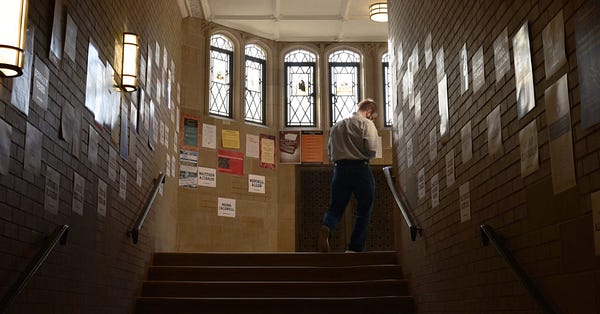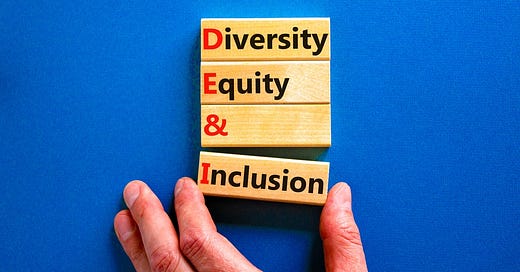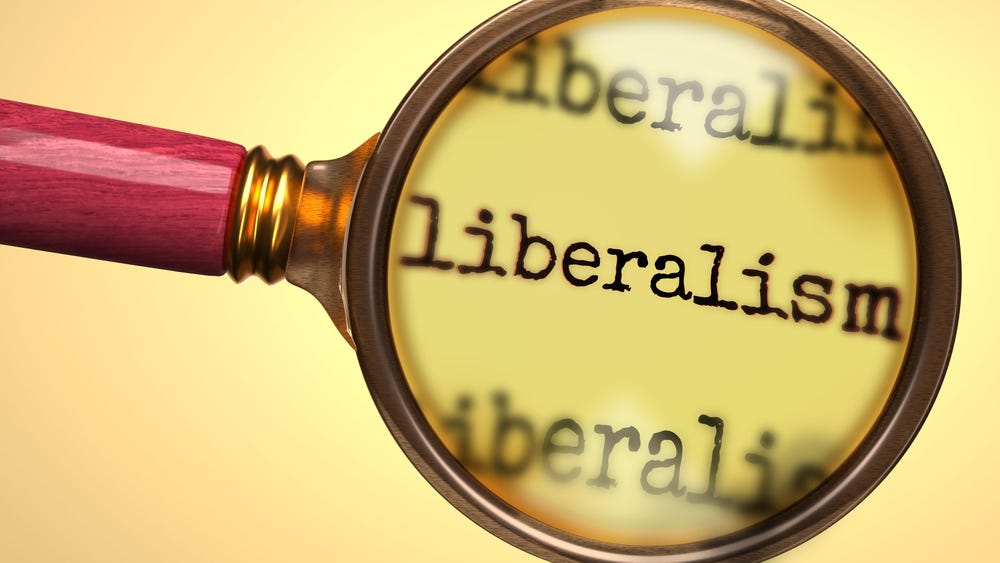E-Pluribus | April 4, 2022
The false promises of diversity, equity and inclusion; a first-person account of a DEI seminar; and what the enemies of classical liberals can teach us about it.
A round up of the latest and best writing and musings on the rise of illiberalism in the public discourse:
Aron Ravin: The Short-Sighted, Ignoble Lie of DEI
While “diversity, equity and inclusion” initiatives on college campuses are usually instituted by the administration, Aron Ravin points out at National Review that those running the schools are often driven by pressure from a small but vocal group of those attending.
In some sense, we ought to celebrate the fact that university administrations have declined to enforce and regulate student interactions as much as many of the illiberal campus zealots would like. But these administrations fail to realize how dangerous it is to leave DEI in the hands of a cluster of immature college students. To call back to UConn, last year, several student senators attempted to pass a motion in their student government supporting free speech, something that every state school is compelled to abide by (Rosenberger v. Rector and Visitors of the University of Virginia). The UConn administration did not deign to participate in the ensuing debate, despite the growing escalation and vitriol. According to several student senators in attendance, one particularly vitriolic senator opened his speech declaring, “I am so sick and tired of all you white folk,” and condemned the bill as a tool to defend hate speech and exclude minorities. Suffice it to say, the student government did not affirm the principle of free speech.
The five-year plan (an unfortunate word choice) of Yale University to expand diversity initiatives across its premises provides another lens into this phenomenon. Commitments from the various schools that make up the broader institution are just as empty as those of competing universities. Here, the method of DEI instruction is of particular note. Most of the videos are presented by students with the piercings, intonation, and hair colors of the everyday campus crusader. The offices of Gender & Campus Culture (OGCC) and Diversity & Inclusion appear to recruit trainers straight out of the affinity groups and populations that would try to destroy administrators for any perceived injustice. It’s incredibly cynical. By making identity-obsessed students personally responsible for the “education” of their peers, faculty can theoretically avoid blame when things go wrong.
This kind of thinking is absurd. No degree of decentralized indoctrination (nor petitions to the Bar Association) can quench a leftist mob’s thirst for retribution. Somehow, even after the latest bedlam at Yale Law School, the raging students continue to claim the moral high ground, complaining about the mere presence of police at a recent Federalist Society event. Revolutionaries are rarely satisfied.
Read the whole thing.
Daniel Nuccio: That time I attended a DEI seminar with one of the folx working to reimagine STEM
The STEM (Science, Technology, Engineering, and Mathematics) fields are often touted as the wave of the future, but current trends seem to emphasize social concerns over academic ones. Daniel Nuccio of The College Fix tells about his experience hearing from a biochemist about STEM’s “racist imperialistic set of frameworks” rather than the subject matter of her field.
Colorado College biogeochemist Rebecca Barnes researches how human activity related to such industries as energy and agriculture can alter surrounding aquatic and terrestrial environments at a chemical level, sometimes with disastrous consequences like wildfires and toxic algal blooms.
But that’s not the topic I got to hear Barnes speak about when she Zoomed in to my department’s weekly seminar series earlier this year.
No, that afternoon when presenting to the biology department at Northern Illinois University, where I am a PhD student, Barnes instead talked about her work with ADVANCEGeo, a progressive, federally funded activist organization working to reshape and reimagine STEM around the principles of Diversity, Equity and Inclusion.
Like many proponents of DEI, Barnes maintains a focus on unequal or disproportionate representation. Yes, white female scientists have progressed, but scientists of color and LGBTQ scholars continue to be excluded and undervalued, she argued.
[ . . . ]
Even though Barnes did touch upon workplace power dynamics and safety issues, the primary focus of her seminar was on DEI. Western science “is based in this, like, racist imperialistic set of frameworks,” she said.
Thus STEM departments, according to Barnes, teem with sexual harassment and sexual abuse, bullying, institutional racism, and microaggressions. Collectively they create what she refers to as a “hostile obstacle course” for all seeking a career in academic STEM, save white men, and possibly white women.
“We need to deal with gender harassment. We need to deal with so-called ‘microaggressions.’ We need to deal with bullying and all of these things,” she said.
Read it all.
Ezra Klein: The People Who Hate Liberalism Are Teaching Us What It Is
In his most recent column, Ezra Klein of the New York Times explores the themes of liberalism and Christianity in a new book by author Matthew Rose in the context of Putin’s invasion of Ukraine as well as other modern day authoritarians. Lessons can, at times, be learned about particular belief systems and ideologies from their enemies in clearer ways than from their proponents.
[In his new book, “A World After Liberalism,” Matthew Rose] means liberalism as in the shared assumptions of the West: a belief in human dignity, universal rights, individual flourishing and the consent of the governed.
That liberalism has been battered by financial crises, the climate crisis, checkered pandemic responses, right-wing populists and a rising China. It seems exhausted, ground down, defined by the contradictions and broken promises that follow victory rather than the creativity and aspiration that attend struggle.
At least, it did. Ukraine’s refusal to bend the knee to Vladimir Putin has reminded the West that, for those who have not yet learned to take it for granted, life under liberalism is worth fighting for. But true renewal will require more than horror at Russia’s invasion or paeans to Ukraine’s courage. It will mean grappling with liberalism’s deficiencies and rediscovering its core radicalism.
[ . . . ]
The misplaced shock that Putin would act as so many past leaders acted, that he would try to take what he wants just because he can, reflects liberalism’s long work remaking not just what we believe to be moral but what we believe to be normal. At its best and sometimes at its worst, liberalism makes the past into a truly foreign land, and that can turn those who still inhabit it into anachronisms in their own time. But liberals deceive themselves when they believe that that happens only to liberalism’s enemies. It also happens to liberalism’s would-be friends.
Read it all here.
Around Twitter
A thread from Peter Boghossian on discourse: the substance of discourse is what matters, not discourse just for the sake of discourse:





Via Nicholas Christakis, the true nature of the March 10th “protest” at Yale, where students shouted down the speakers at a Federalist Society panel, is starting to be reported more accurately in the school’s campus newspaper (with additional comments):




Chris Arnade on why the extremes seem to prosper:

And finally, most of what we hear today about slavery is discussed in the past tense (think 1619 Project).a From the Foundation Against Intolerance & Racism, a look at modern day slavery:









